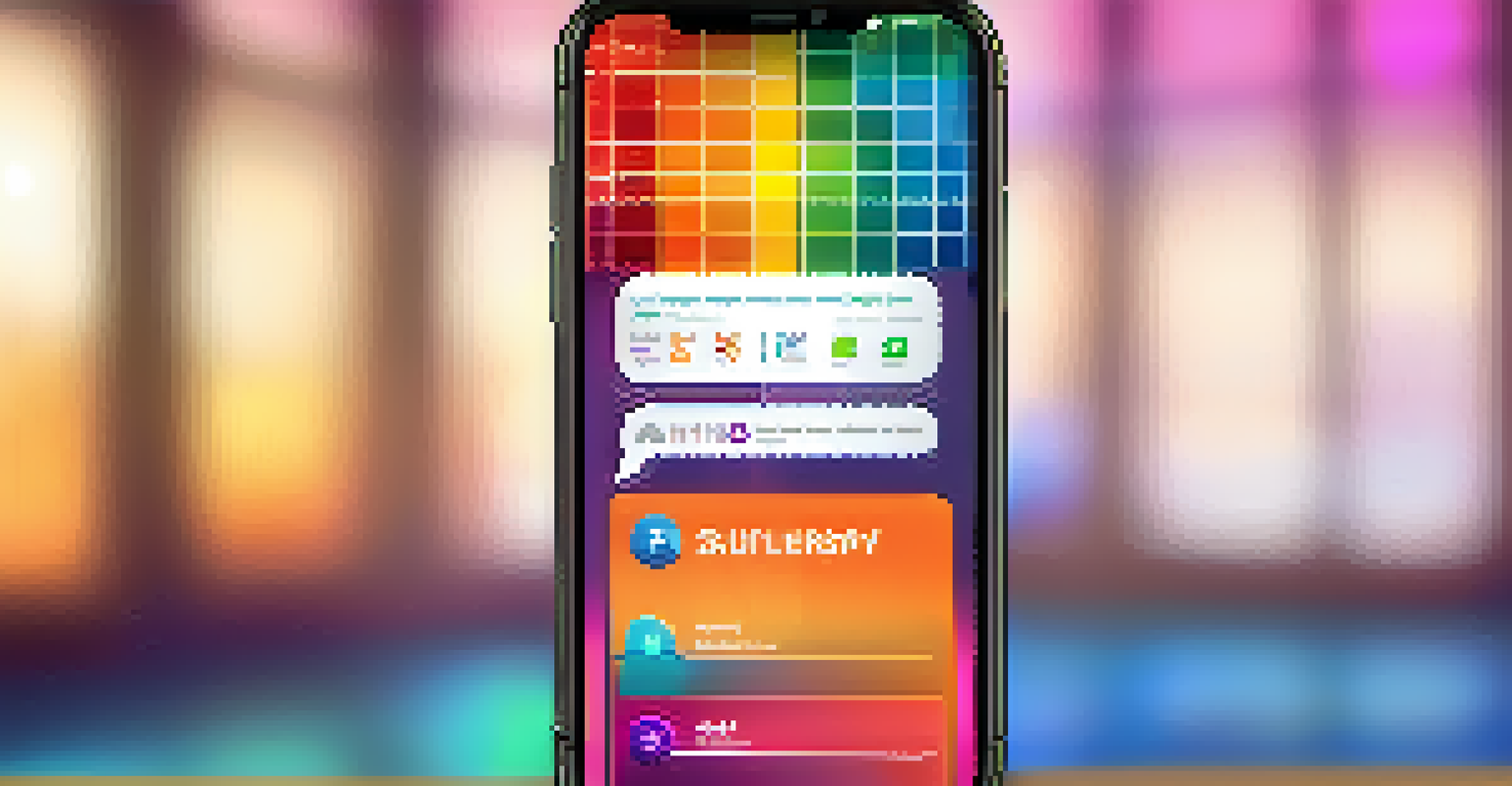Mobile Applications: A New Frontier in Addiction Recovery Support

Understanding the Role of Technology in Recovery
In today's digital age, technology plays a pivotal role in various aspects of our lives, including addiction recovery. Mobile applications have emerged as invaluable tools, offering support and resources at the tap of a finger. They bridge the gap between traditional therapy and modern convenience, making recovery more accessible to individuals everywhere.
Technology is best when it brings people together.
These apps can provide a range of services, from daily motivational quotes to tracking progress and connecting with support groups. By utilizing technology, individuals can engage with their recovery process more actively, fostering a sense of empowerment. This shift allows for a personalized approach, catering to the unique needs of each user.
Moreover, the anonymity and privacy that mobile apps offer can encourage individuals to seek help without the fear of judgment. This is particularly important in addiction recovery, where stigma often prevents people from reaching out. By harnessing technology, we can create a more inclusive environment for those on their recovery journey.
Key Features of Addiction Recovery Apps
Addiction recovery apps come packed with features designed to support users in their journey. Common functionalities include goal setting, progress tracking, and reminders for self-care activities. These features not only help users stay accountable but also remind them of their commitment to recovery.

Additionally, many apps facilitate access to educational resources, providing users with information about addiction, coping strategies, and recovery techniques. Knowledge is power, and having this information readily available can significantly enhance a person's understanding of their situation. It can also help them make informed decisions throughout their recovery.
Tech Enhances Recovery Accessibility
Mobile apps provide essential support and resources, making addiction recovery more accessible and personalized for users.
Another vital aspect is the community support that these apps often provide. Through forums and chat functions, users can connect with others facing similar challenges, fostering a sense of camaraderie. This social interaction can be crucial, as it helps individuals realize they are not alone in their struggles.
Benefits of Using Mobile Apps for Recovery
The benefits of using mobile applications for addiction recovery are vast and varied. Firstly, they offer convenience, allowing users to access support and resources anytime, anywhere. This on-demand access can be especially beneficial during moments of temptation or crisis, providing immediate help when it’s most needed.
The greatest discovery of my generation is that a human being can alter his life by altering his attitudes.
Moreover, mobile apps often promote self-reflection through journaling features or mood tracking. By encouraging users to document their thoughts and feelings, these tools can help individuals identify triggers and patterns in their behavior. This level of self-awareness is essential for long-term recovery success.
Lastly, many apps incorporate gamification elements, turning recovery into an engaging and rewarding experience. By earning points or badges for completing tasks, users can feel a sense of accomplishment, motivating them to continue their efforts. This playful approach can make the often daunting process of recovery feel more manageable.
Real-World Examples of Successful Recovery Apps
Several mobile applications have gained recognition for their effectiveness in supporting addiction recovery. One notable example is 'Sober Grid,' which connects individuals in recovery through a social network, allowing them to share their experiences and seek help from peers. This app illustrates the power of community in the recovery journey.
Another example is 'I Am Sober,' which allows users to track their sobriety milestones and provides daily motivation. The app features a supportive community where users can celebrate their achievements and share challenges. This sense of accountability and support can significantly enhance the recovery experience.
Community Support is Key
Many recovery apps foster community connections, allowing individuals to share experiences and find camaraderie in their journey.
Lastly, 'SMART Recovery' offers a science-based approach to recovery, providing tools and resources grounded in research. Users can access meetings, worksheets, and other educational materials, empowering them to take charge of their recovery. These examples highlight the diverse ways mobile apps can cater to individual needs in the recovery process.
The Importance of Personalization in Recovery Apps
Personalization is a vital aspect of addiction recovery, and mobile applications excel in this area. Many apps allow users to tailor their experience by selecting features that resonate with their specific needs and preferences. This customization can significantly impact a user's engagement and commitment to their recovery journey.
For instance, some users may prefer a focus on mindfulness and meditation practices, while others may benefit from goal-setting tools or progress tracking. By providing a range of options, these apps can cater to different recovery styles, making it easier for individuals to find what works best for them. This flexibility is crucial, as recovery is not a one-size-fits-all process.
Additionally, personalization can help users establish a deeper connection with the app. When individuals feel that their unique journey is acknowledged and supported, they are more likely to engage with the app regularly. This ongoing interaction can lead to better outcomes and a more successful recovery experience.
Challenges and Limitations of Recovery Apps
While mobile applications offer numerous benefits for addiction recovery, they are not without challenges and limitations. One concern is the potential for over-reliance on these tools, where individuals may prioritize app engagement over face-to-face support. It's essential to strike a balance between digital resources and traditional recovery methods.
Another challenge is the varying quality of available apps. With an influx of options, it can be difficult for users to discern which apps are effective and trustworthy. To address this, individuals should seek recommendations from professionals or trusted sources to ensure they choose reliable tools that genuinely support their recovery.
Personalization Boosts Engagement
Customizable features in recovery apps help users tailor their experiences, fostering deeper engagement and commitment to their recovery.
Lastly, privacy and security concerns are paramount when using mobile applications. Users must be cautious about sharing personal information, as data breaches can compromise their confidentiality. Developers need to prioritize user privacy and implement robust security measures to protect sensitive information.
Looking Ahead: The Future of Recovery Support Apps
The future of addiction recovery support through mobile applications looks promising. As technology continues to evolve, we can expect more innovative features and functionalities that enhance user experiences. For example, advancements in artificial intelligence could lead to personalized recovery plans based on user data and behavior.
Moreover, the integration of virtual reality (VR) and augmented reality (AR) may provide immersive experiences for users, allowing them to practice coping strategies in simulated environments. This could offer a new dimension to recovery support, making it even more engaging and practical.

Finally, as the conversation around mental health and addiction continues to grow, we can anticipate increased collaboration between app developers and addiction professionals. This partnership can lead to more evidence-based applications that better serve individuals in their recovery journey. Together, we can harness the power of technology to create a brighter future for addiction recovery.